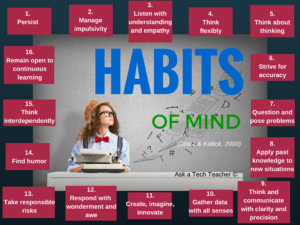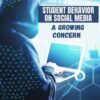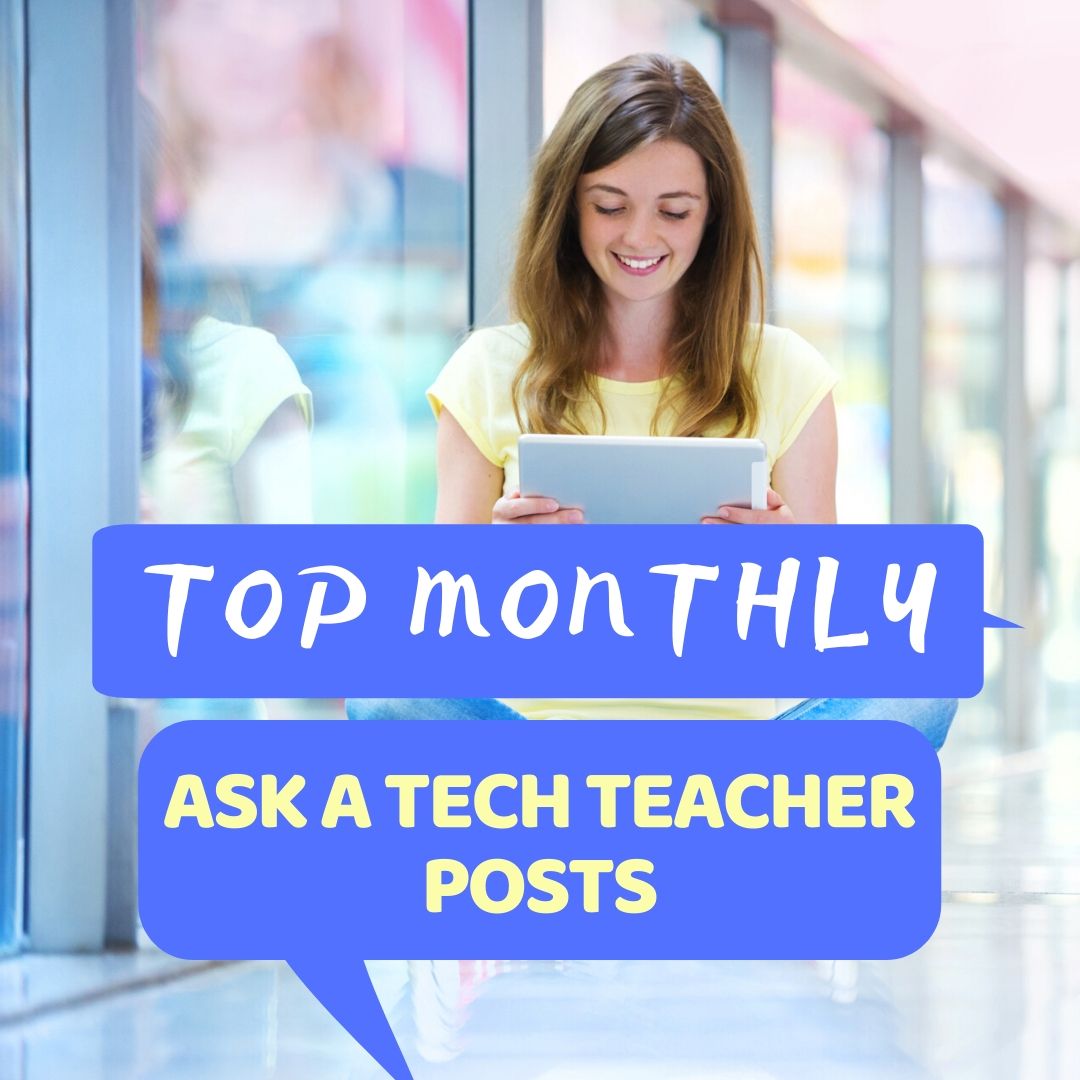
Author: Jacqui
Jacqui Murray has been teaching K-18 technology for 30 years. She is the editor/author of over a hundred tech ed resources including a K-12 technology curriculum, K-8 keyboard curriculum, K-8 Digital Citizenship curriculum. She is an adjunct professor in tech ed, Master Teacher, an Amazon Vine Voice, freelance journalist on tech ed topics, contributor to NEA Today, and author of the tech thrillers, To Hunt a Sub and Twenty-four Days. You can find her resources at Structured Learning.
A Lesson Plan for Addressing What’s in the News
 Teaching students about current events used to be as easy as picking a trusted newspaper and reading their headlines. Those days are gone with fake news, yellow journalism, and opinions dressed up as news stories. So how to you talk about what’s in the news? Marcee Harris over at Teaching Channel has a lesson plan to help you:
Teaching students about current events used to be as easy as picking a trusted newspaper and reading their headlines. Those days are gone with fake news, yellow journalism, and opinions dressed up as news stories. So how to you talk about what’s in the news? Marcee Harris over at Teaching Channel has a lesson plan to help you:
How to Talk About What’s in the News: A Lesson Plan
By Marcee Harris on March 31, 2021
When our students enter our classrooms, they come with bits and pieces of news from home, their social media feeds, and from conversations with friends. This news can create a sense of fear and worry for some, as well as generate lots of unanswered questions. Tackling these tough topics in the classroom can be a challenge, especially for educators who come from different backgrounds than their students. Despite the uncertainty of what to say, it’s imperative that we honor our kids’ news and engage in dialogue that explores their questions. This process will open students up to a range of perspectives and nurture critical thinking skills.
More from Ask a Tech Teacher on news, sources, teaching with it:
Jacqui Murray has been teaching K-18 technology for 30 years. She is the editor/author of over a hundred tech ed resources including a K-12 technology curriculum, K-8 keyboard curriculum, K-8 Digital Citizenship curriculum. She is an adjunct professor in tech ed, Master Teacher, webmaster for four blogs, an Amazon Vine Voice, CSTA presentation reviewer, freelance journalist on tech ed topics, and author of the tech thrillers, To Hunt a Sub and Twenty-four Days. You can find her resources at Structured Learning.
Share this:
- Click to share on Facebook (Opens in new window) Facebook
- Click to share on X (Opens in new window) X
- Click to share on LinkedIn (Opens in new window) LinkedIn
- Click to share on Pinterest (Opens in new window) Pinterest
- Click to share on Telegram (Opens in new window) Telegram
- Click to email a link to a friend (Opens in new window) Email
- More
Guiding Students through the Crisis in Ukraine
Here are great ideas for how to address the difficult topic of war in the Ukraine, from Ask a Tech Teacher collaborator, Christian Miraglia, recently retired from teaching after thirty-six years:
24/7
As events unfold in Ukraine, people want to know how the situation might play out. Glancing at the Apple Newsfeed or Twitter for minute-to-minute updates becomes an obsession. For many students, checking on Tik-Tok and Instagram is their source of information. In the classroom, questions on the location of Ukraine, the why of the Russian invasion, and what does the future hold are commonplace. So how does a teacher navigate these conversations?
Essential Skills
As a history teacher, I made it a priority to teach my students how to check the reliability of sources. This became increasingly important over the past decade as social media became the primary source for news. It was not uncommon for a class to start with a comment, “Did you see …?” My response to the student was, “What was the source of information, and how do you know if it is reliable?” A typical year in the class began with learning how to source information using the Reading Like a Historian lessons from the Stanford History Education Group. I also utilized the Civic Reasoning curriculum, which focused on developing critical thinking skills to navigate social media and news. With Ukraine dominating the news cycle, these skills are still essential.
Here are some basic principles and resources that can be helpful when addressing the conflict in Ukraine. These tenents are applicable for any sensitive topic or event discussed in class.
- As with any subject when using social media as a tool for study, teachers should review postings as some material may not be suitable for student consumption.
- Use the Civil Discourse materials from Facing History and Ourselves at the beginning of the year so that both you, as a teacher and students, have a framework for approaching complex subjects. Some students may have family or friends serving in the military or have students who may have family from Ukraine.
- Ask the student about the source of information. Check social media feeds and news feeds so students can compare the credibility of sources. Providing students with sentence frames for responding to the question is necessary.
- Ask students why the event is important. Keep in mind that our students may be asking questions based on their fears. For example, students may ask if the events in Ukraine will lead to World War III.
- Make use of geography tools such as Google Maps or the history of Ukraine in maps found on the Washington Post site, as many students do not have a sense of the expansiveness of the world.
- Use proven resources such as Brown University’s Choices Program, which provides teachers with comprehensive lessons on the crisis.
Embrace Conversations
The past five years have created challenges for teachers time and time again with global and national events. Our students are on a similar journey. The description on the Stanford History Education Group’s Civic Reasoning page reads, “Students are confused about how to evaluate online information. We all are.” With each critical piece of news comes a chance to provide our students a platform to voice their concerns and synthesize the information they consume. One might call these “hard conversations,” but embracing these opportunities with the proper resources ultimately builds the foundations of becoming informed citizens.
Bio:
Christian Miraglia is a recently retired 36-year educator and now Educational Technology Consultant at t4edtech where he also blogs at Edtech and Things Related. He can be found on Twitter @T4edtech, Linkedin, and on his YouTube Channel Transformative Edtech.
Share this:
- Click to share on Facebook (Opens in new window) Facebook
- Click to share on X (Opens in new window) X
- Click to share on LinkedIn (Opens in new window) LinkedIn
- Click to share on Pinterest (Opens in new window) Pinterest
- Click to share on Telegram (Opens in new window) Telegram
- Click to email a link to a friend (Opens in new window) Email
- More
Websites that add sparkle (and learning) to Spring
A few spring websites, lesson plans, printables, activities:
- 7 Science Experiments that Teach About Spring
- Books from Scholastic about Spring
- Life cycle of a snake
- Life Cycle Lesson Plans
- Life Cycle resources
- Life Cycles
- Life Cycle Symbaloo
- Plant life cycle
- Spring Puzzle
- Spring Garden–click to find flowers
- Spring Games
- Spring Vocabulary (video)
- Spring Word Scramble
- Spring Word Search
- What Happens in Spring (video)
- What Happens in Spring–PS (video)
Ideas from TeacherVision:
Printables
- The Very Hungry Caterpillar Activities Booklet
- Butterfly Life Cycle Worksheet
- Baseball Fun
- May Day
- Butterfly Facts and Questions
- Butterfly Life Cycle Quiz
- The Very Hungry Caterpillar Poster & Activities
- More Spring Printables
Lesson Plans
Share this:
- Click to share on Facebook (Opens in new window) Facebook
- Click to share on X (Opens in new window) X
- Click to share on LinkedIn (Opens in new window) LinkedIn
- Click to share on Pinterest (Opens in new window) Pinterest
- Click to share on Telegram (Opens in new window) Telegram
- Click to email a link to a friend (Opens in new window) Email
- More
5 (free) Posters about Learning
Every month, we’ll share five themed posters that you can share on your website (with attribution), post on your walls, or simply be inspired.
This month: Learning
–for the entire collection of 65 posters, click here
Jacqui Murray has been teaching K-18 technology for 30 years. She is the editor/author of over a hundred tech ed resources including a K-12 technology curriculum, K-8 keyboard curriculum, K-8 Digital Citizenship curriculum. She is an adjunct professor in tech ed, Master Teacher, webmaster for four blogs, an Amazon Vine Voice, CSTA presentation reviewer, freelance journalist on tech ed topics, contributor to NEA Today, and author of the tech thrillers, To Hunt a Sub and Twenty-four Days. You can find her resources at Structured Learning.
Share this:
- Click to share on Facebook (Opens in new window) Facebook
- Click to share on X (Opens in new window) X
- Click to share on LinkedIn (Opens in new window) LinkedIn
- Click to share on Pinterest (Opens in new window) Pinterest
- Click to share on Telegram (Opens in new window) Telegram
- Click to email a link to a friend (Opens in new window) Email
- More
Tech Tip #14: Desktop Icons Disappeared
 In these 169 tech-centric situations, you get an overview of pedagogy—the tech topics most important to your teaching—as well as practical strategies to address most classroom tech situations, how to scaffold these to learning, and where they provide the subtext to daily tech-infused education.
In these 169 tech-centric situations, you get an overview of pedagogy—the tech topics most important to your teaching—as well as practical strategies to address most classroom tech situations, how to scaffold these to learning, and where they provide the subtext to daily tech-infused education.
Today’s tip: Desktop Icons Disappeared
Category: PC
Q: My desktop icons disappeared for no known reason. What do I do?
A: This is a question I get often. One moment, shortcuts are lined up like little soldiers. The next, not. Try:
- Right click on the desktop.
- Select
- Make sure ‘Show Desktop Icons’ is checked.
Desktop icons reappear.
Sign up for a new tip each week or buy the entire 169 Real-world Ways to Put Tech into Your Classroom.
What’s your favorite tech tip in your classroom? Share it in the comments below.
Share this:
- Click to share on Facebook (Opens in new window) Facebook
- Click to share on X (Opens in new window) X
- Click to share on LinkedIn (Opens in new window) LinkedIn
- Click to share on Pinterest (Opens in new window) Pinterest
- Click to share on Telegram (Opens in new window) Telegram
- Click to email a link to a friend (Opens in new window) Email
- More
Social Media or COVID: Which is more dangerous to students?
Not a surprise that student use of social media is way up since remote learning became de rigeur in learning. Social media limits users to 13+ but doesn’t monitor that. What could sober education’s on-going concern about the dangers of COVID is the booming number of arrests of students for misuse of social media. My conclusion: We aren’t teaching enough about the proper use of social media platforms and the danger of cyberbullying.
Read this article from DA District Administration and see if you agree:
Student behavior on social media is now a bigger threat than COVID
by Matt Zalaznick
Though the threats appear unfounded, they are closing classrooms and raising anxiety as schools are trying to find some send of normalcy.
More from Ask a Tech Teacher on social media:
Share this:
- Click to share on Facebook (Opens in new window) Facebook
- Click to share on X (Opens in new window) X
- Click to share on LinkedIn (Opens in new window) LinkedIn
- Click to share on Pinterest (Opens in new window) Pinterest
- Click to share on Telegram (Opens in new window) Telegram
- Click to email a link to a friend (Opens in new window) Email
- More
Subscriber Special: 10% Discount
Every month, subscribers to our newsletter get a free/discounted resource to help their tech teaching.
March
Sign up for our newsletter. Then get 10% off your next purchase!
Questions? Email askatechteacher@gmail.com
Jacqui Murray has been teaching K-18 technology for 30 years. She is the editor/author of over a hundred tech ed resources including a K-12 technology curriculum, K-8 keyboard curriculum, K-8 Digital Citizenship curriculum. She is an adjunct professor in tech ed, Master Teacher, webmaster for four blogs, an Amazon Vine Voice, CSTA presentation reviewer, freelance journalist on tech ed topics, and author of the tech thrillers, To Hunt a Sub and Twenty-four Days. You can find her resources at Structured Learning.
Share this:
- Click to share on Facebook (Opens in new window) Facebook
- Click to share on X (Opens in new window) X
- Click to share on LinkedIn (Opens in new window) LinkedIn
- Click to share on Pinterest (Opens in new window) Pinterest
- Click to share on Telegram (Opens in new window) Telegram
- Click to email a link to a friend (Opens in new window) Email
- More
What You Might Have Missed in February What’s up in March
Here are the most-read posts for the month of February:
- Groundhog Day and the 100th Day of School
- #WorldReadAloudDay February 2
- Simulations as a Teaching Strategy
- Model Teaching–How Today’s Educators Learn
- Translate Webpages In a Second
- 14 Valentine Sites For Students
- How Does the Metaverse Fit into Education?
- Random Acts of Kindness Day
- Track Your Stuff
- Logitech Pen–No Setup, No Batteries, No Problems
Here’s a preview of what’s coming up in March:
- Subscriber Special
- Social Media or COVID: Which is more dangerous to students?
- Free Posters
- Invention Convention
- Pi Day
- Apps for Curious Students
- St. Patrick’s Day REsources
- Resources for Architecture/Engineering
- World Backup Day
- How Twitter makes you a better writer

Share this:
- Click to share on Facebook (Opens in new window) Facebook
- Click to share on X (Opens in new window) X
- Click to share on LinkedIn (Opens in new window) LinkedIn
- Click to share on Pinterest (Opens in new window) Pinterest
- Click to share on Telegram (Opens in new window) Telegram
- Click to email a link to a friend (Opens in new window) Email
- More
Teacher-Authors: What’s Happening on my Writer’s Blog
A lot of teacher-authors read my WordDreams blog. In this monthly column, I share the most popular post from the past month on that blog:
***
 Tech Tips for Writers is an occasional post on overcoming Tech Dread. I’ll cover issues that friends, both real-time and virtual, have shared. Feel free to post a comment about a question you have. I’ll cover it in a future tip.
Tech Tips for Writers is an occasional post on overcoming Tech Dread. I’ll cover issues that friends, both real-time and virtual, have shared. Feel free to post a comment about a question you have. I’ll cover it in a future tip.
This tip is about spam. I am fed up with it! The law requires email senders include ‘unsubscribe’ in the email (at least, they do in America–not sure about other countries), but that doesn’t apply to text messages. I didn’t get much spam there until recently and they’re annoying!
Here’s a trick that will stop some:
- Select the text message.
- Select the sender from the top detail with click-hold (in the case of the video, I click-hold the phone number). It will open the contact card
- Click ‘Info’
- One of the options toward the bottom will be ‘Block’. Click that.
- When you return to the email, it will show it’s blocked.
Share this:
- Click to share on Facebook (Opens in new window) Facebook
- Click to share on X (Opens in new window) X
- Click to share on LinkedIn (Opens in new window) LinkedIn
- Click to share on Pinterest (Opens in new window) Pinterest
- Click to share on Telegram (Opens in new window) Telegram
- Click to email a link to a friend (Opens in new window) Email
- More
Logitech Pen–No Setup, No Batteries, No Problems
 In my classes, there are still a lot of technology skills that are difficult for students. One–developing good enough typing skills that they can find keys without slowing their thinking. Another–all those menus! They want to jot a note on a PDF or a webpage, but don’t know where to find the tool for that. Keep in mind, I’m the tech teacher and still, I complain heartily about technology!
In my classes, there are still a lot of technology skills that are difficult for students. One–developing good enough typing skills that they can find keys without slowing their thinking. Another–all those menus! They want to jot a note on a PDF or a webpage, but don’t know where to find the tool for that. Keep in mind, I’m the tech teacher and still, I complain heartily about technology!
Enter the stylus. It’s touted to write on a touchscreen as easily as pen on paper. Sure, in its absence, kids–and adults–could use their finger, but there are a lot of reasons why a stylus is better:
- It’s faster for notetaking and more precise for drawing.
- Little hands are dirty, as are big hands, and full of germs. A stylus minimizes those issues.
- Users with hand issues–or orthopedic disabilities–can’t use fingers well. A stylus makes up for that.
- If you’re using a digital device outdoors, it may be too cold to take your gloves off. A stylus solves that.
But styluses have problems, too:
- Most run on batteries that always seem to be out.
- They are typically paired to a particular computer that always seems NOT the one the student (or adult) is using.
- Some have to be turned on.
Until Logitech entered the marketplace with their Logitech Pen.
Share this:
- Click to share on Facebook (Opens in new window) Facebook
- Click to share on X (Opens in new window) X
- Click to share on LinkedIn (Opens in new window) LinkedIn
- Click to share on Pinterest (Opens in new window) Pinterest
- Click to share on Telegram (Opens in new window) Telegram
- Click to email a link to a friend (Opens in new window) Email
- More
























































